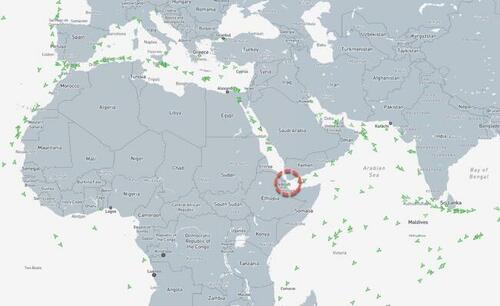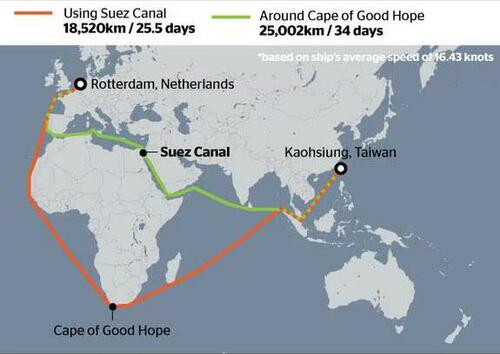Most Large Container Ships Abandon Red Sea As Key Trade Route Freezes
Update (1424ET):
Tracking the supply chain mess unfolding across the Red Sea is a post on X showing container ships with 8,000 or more twenty-foot equivalent unit container capacity have mostly diverted from the critical maritime trade route.
"Every containership over 8,000TEUs, except for one, have turned from the Bab el-Mandeb," X user Sal Mercogliano wrote.
Mercogliano continued, "This means that all the major ocean container lines have abandoned the region even after the @DeptofDefense and @CENTCOM have announced Op Prosperity Guardian."
Every containership over 8,000TEUs, except for one, have turned from the Bab el-Mandeb.
— Sal Mercogliano (WGOW Shipping) 🚢⚓🐪🚒🏴☠️ (@mercoglianos) December 20, 2023
This means that all the major ocean container lines have abandoned the region even after the @DeptofDefense and @CENTCOM have announced Op Prosperity Guardian. pic.twitter.com/kHNMPwx6fP
Earlier, Bloomberg reported container ship re-routings from the Red Sea around the Cape of Good Hope would cause possible shortages of some products due to an extra one to two weeks at sea.
Ikea and Abercrombie are two retailers already concerned about not having enough products on store shelves due to shipping disruptions:
Swedish flatpack furniture giant Ikea said it's looking for other options to secure the availability of its products, many of which normally pass through the Red Sea and the Suez Canal on their way from factories in Asia to Europe and other markets.
Global shipping companies including A.P. Moller-Maersk A/S and Hapag-Lloyd AG have diverted cargoes after Iran-backed Houthi militants intensified attacks on commercial vessels navigating the Red Sea.
The attacks, linked to the Israel-Hamas war, have created another shipping emergency more than two years after a vessel stuck in the Suez Canal snarled global trade. Ohio-based Abercrombie aims to swap sea freight for air wherever possible to avoid disruptions, according to an email to suppliers seen by Bloomberg News. -Bloomberg
The current concern is that turmoil in the Red Sea might persist for weeks, possibly months, surpassing the six-day blockage of the Suez Canal in 2021 caused by the Evergiven container ship incident.
* * *
Global transport and logistics company Kuehne + Nagel International AG reports more than 100 container ships have been rerouted from the Red Sea around Africa to avoid Iran-backed Houthi militants in Yemen who attack commercial vessels with missiles and drones.
Bloomberg released two headlines early Wednesday detailing Kuehne + Nagel's update on the Red Sea. The logistics firm said 103 container ships have detoured around the Cape of Good Hope, lengthening travel time by 1 to 2 weeks. It expects the number of detours to rise in the coming days.
For commercial vessels still transiting the vital waterway that connects to the Suez Canal, Bloomberg noted in a separate report that the cost of insuring jumped this week from about .1% to .2% of the hull value to .5%. A $100 million vessel must pay about $500,000 per voyage.
Increased insurance costs plus more extended travel around the Cape of Good Hope only suggest snarled supply chains and increased prices of goods.
"Both options of increased premiums and rerouting around Africa will see a knock-on effect on the price of goods," said Toby Vallance, Executive Committee Member of the London Forum of Insurance Lawyers.
Euronav NV Chief Executive Officer Alexander Saverys told Bloomberg TV that the disruption in the Red Sea "will slow down the trade because we will have to wait for a convoy to pass through." The petroleum tanker giant halted shipments through the Red Sea early this week and won't transit the region unless there are military escorts. Several other major shipping firms stopped traveling through the area this week (read: here).
Called "Operation Prosperity Guardian," the Pentagon hasn't released exact details on how it plans to escort commercial vessels through the conflict region. Vincent Clerc, the chief executive of container shipping giant A.P. Moller-Maersk A/S, said it could take several weeks for the task force to become operational.
Meanwhile, National Security Council spokesperson John Kirby said the Biden administration was considering re-designating Iran-backed Houthis as a "terrorist organization." The administration is also considering possible military strikes but will try diplomacy first to thwart a regional conflict that would send energy prices through the roof into an election year.
The need to quickly secure the vital waterway for global trade is underscored by logistics intelligence firm Project 44 data showing that 20% of containers passing through Suez are from Asia to European and Mediterranean nations.
"The best the world can hope for may be a moderate risk scenario, in which shipping is diverted for at least several months until the security situation in the Red Sea stabilizes," Bloomberg Economics analysts wrote in a report.

